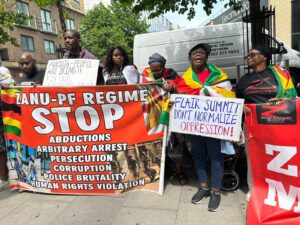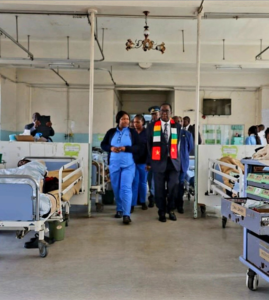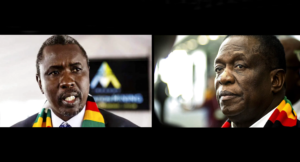ZIMBABWE GOVERNMENT SELLING POSB IN A SHADY DEAL
The government of Zimbabwe, under President Emmerson Mnangagwa and Attorney-General Virginia Mabiza, is trying to sell the People’s Own Savings Bank (POSB) to a suspicious group of investors. These investors promise to bring in US$70 million and give the government a US$6 billion loan. But this deal looks like a scam. The people involved do not seem to be real investors. They have no proper business records, and their promises sound too good to be true.
The company that wants to buy POSB is called Hebrew Investment Group (HIG). It is led by Morris Brown Gwedegwe, a religious leader linked to ZANU PF. Documents show that Mnangagwa has ordered POSB to be sold to this company, even though there are warnings that it is a bad deal. The president seems blinded by the billions promised.
POSB is an important bank for Zimbabweans. It helps pay civil servants and pensioners. It also gives out loans to workers. If the bank falls into the wrong hands, many people could lose their money. The government is supposed to follow clear rules when selling a public asset like POSB, but Mnangagwa has ignored these rules. Instead, he told Mabiza to push the deal forward without proper checks.
This is not the first time that Zimbabwean officials have fallen for questionable deals. Experts warn that groups like HIG often pretend to invest money when they are actually planning to steal from the country. They use these fake investments to launder money or commit fraud. HIG does not even have a website, and its executives are not well known in the business world.
The sale of POSB is being pushed despite warnings from the Zimbabwe Investment and Development Agency (ZIDA) and the Mutapa Investment Fund (MIF), which oversees state-owned companies. These organizations advised against selling to HIG, but Mnangagwa still wants to go ahead.
POSB’s board was appointed last year by John Mangudya, the former governor of the Reserve Bank of Zimbabwe (RBZ). The chairman of the board, Kenias Mafukidze, is also the head of Alpha Media Holdings, a private media company. This puts him in a difficult position because a media company should be exposing corruption, not getting involved in it.
Instead of allowing different companies to bid for POSB in a fair process, Mnangagwa picked HIG himself. The company has no business history, no financial records, and no proof that it can handle such a big investment. The plan is for HIG to take 70% of the bank, while the government keeps 10% and private investors get 20%. The US$6 billion loan that HIG is promising sounds unrealistic because Zimbabwe has a poor credit rating and a weak economy.
A letter from Mabiza to POSB’s chief executive, Garainashe Changunda, and the board confirms that HIG is being treated as an official partner. The letter introduces HIG’s executives and says they will soon visit POSB to see its operations. Even more worrying, the letter says the bank’s vaults will be opened for HIG to inspect. This puts people’s savings at risk.
Experts say this deal should be stopped. A former RBZ official said that in the past, scammers have approached the government with fake promises of big investments. Their real goal is to commit fraud. The same thing happened before, but officials caught it in time. This time, the government seems to be ignoring all the warning signs.
RBZ Governor John Mushayavanhu denied that POSB is being sold. He said that any sale would need approval from the Reserve Bank and other regulators. However, his response did not explain the official documents showing the deal is already in progress. The sale is not yet final, but the government is still negotiating. If it moves forward, Zimbabweans could lose billions.
This is another example of how Mnangagwa and his government are mismanaging public resources. Instead of protecting Zimbabwe’s economy, they are making secret deals that put the country at risk. If this sale goes ahead, it could lead to more corruption and financial losses for ordinary Zimbabweans. The people must demand transparency and accountability before it is too late.



